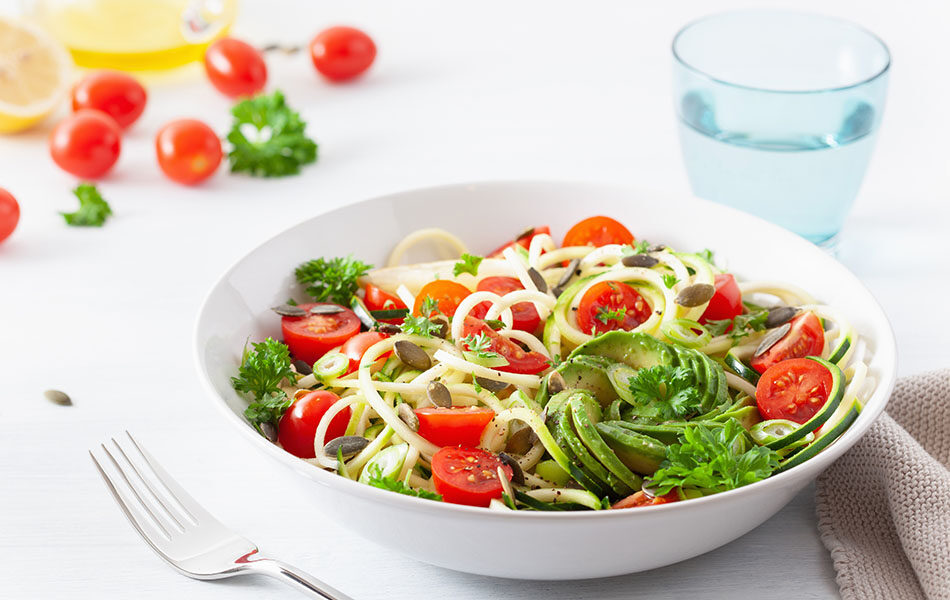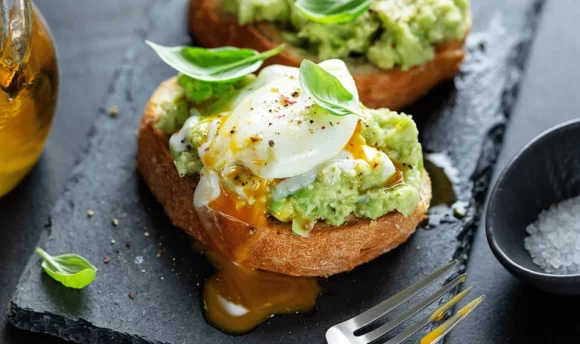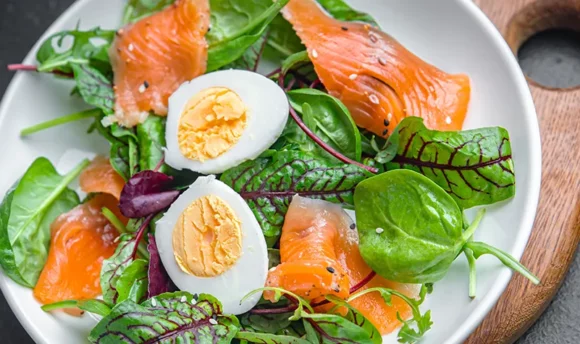Vegan Keto Food List: The Ultimate Guide
Vegan and keto diets are two of the most popular. And, while it may appear hard to combine them, it is doable. This article will go through the items that are and are not allowed on a vegan keto diet.

When you think about it, mixing a ketogenic diet with a vegan one might not make sense.
On the one hand, a ketogenic diet focuses on a high-fat, moderate-protein, and low-carb diet. So, it makes sense to include animal products since they are high in protein and fats.
On the other hand, the vegan diet focuses on carbs to help achieve the daily protein requirements through legumes, nuts, seeds, and other plant-based options.
They seem like the complete opposite.
However, it is possible to mix a ketogenic diet and a vegan diet. With that said, keep in mind it might be a bit challenging, and you might need to put some extra thought into the foods you will have.
In this article, we’ll go over the ultimate list of foods that are and aren’t allowed on a low-carb vegan diet.
What Is Vegan Keto?
A ketogenic diet is a low-carb, moderate-protein, and high-fat diet plan. On average, you consume 5–10% of your calories from carbs, 20% from protein, and 70–80% from fats.
Initially, the low-carb approach was created to decrease epilepsy symptoms. However, people realized it could produce other health benefits such as weight loss, increased energy, improved blood work, and lower blood pressure.
Normally, the body relies on carbs (glucose) for energy. However, on the keto diet, it needs to find a new energy alternative when the glucose supply is suddenly cut. As a result, the body digs into fat stores to produce ketones, making it the new energy currency.
Since the body starts producing more and more ketones, it turns the body into a state of ketosis.
Meanwhile, the vegan diet eliminates all types of animal products like eggs, meat, poultry, fish, and seafood, as well as all products derived from animal sources, such as gelatin and honey.
Despite looking like a quite restrictive diet at first, there are actually numerous benefits of a plant-based diet. Evidence suggests that following a plant-based diet can decrease the risk of heart disease.
In addition, a vegan diet can also promote weight loss and lower the risk of diabetes.
Looking at the benefits of both keto and vegan diets, it might seem that combining the two can promote overall wellness.
But while this might be the case, keep in mind that both diets are considered too restrictive, which makes them hard to sustain.
Vegan Keto Food List
A low-carb, moderate-protein, and high-fat diet might sound complicated. And, on top of that, you cannot have any animal products. Luckily, knowing which foods are and are not allowed makes things easier.
When it comes to vegan keto foods, you can typically find them in any grocery store. The choice might vary depending on the season (especially fruits and vegetables), but you can always make the necessary tweaks in your recipes when needed.
Before we start, there are some symbols you should know about.
Whenever you see a food followed by (p), it means it is high in protein. Likewise, if you see a food followed by (*), it means it is higher in carbs, so you need to be careful before deciding to add it to a keto diet.
Let’s take a look at some products that are perfectly suitable for the vegan keto diet.
#1 Fats, oils, and butters
Healthy fats like avocado and coconut oil will be your allies in any keto diet. After all, 70–80% of your calories must come from fat sources to give your body the necessary energy throughout the day.
One of the benefits of a vegan keto diet is that it only focuses on healthy fats. Since you don’t add animal fats like butter, it reduces the risk of high consumption of saturated fats.
Oils
- Olive oil
- Avocado oil
- Coconut oil
- Flaxseed oil
- Hemp seed oil
- Cacao butter
- Hazelnut oil
- MCT oil
Fats
- Avocado
- Olives
- Coconut
Butter
- Almond butter (p)
- Peanut butter (p)
- Coconut butter
- Macadamia nut butter (*)
- Pecan butter
- Sunflower seed butter
- Tahini
#2 Pantry foods
In a low-carb vegan diet, when it comes to pantry foods, you need to be careful since some might contain carbs.
While they are still considered low-carb, you need to be careful not to stack too many “higher” carb foods to prevent going overboard on your daily carb allowance and ruining your keto diet.
Make sure you read the nutritional label of each pantry food to check how many grams of net carbs (total carbs – fiber) it has.
- Almond flour
- Coconut flour (*)
- Baking powder
- Baking soda
- Cocoa powder
- Dark chocolate (above 85%)
- Nutritional yeast
- Psyllium husk
- Glucomannan powder
- Nori sheets
- Kelp flakes
- Spirulina (p)
- Roasted seaweed
- Chili sauce
- Mustard
- Soy sauce
- Tamari sauce
- Vinegar
- Tomato sauce
- Vanilla extract (check for sugars)
- Apple cider vinegar
- Coffee
- Teas
- Yerba mate
- Sugar-free drinks
#3 Keto sweeteners
Keto sweeteners allow you to add some sweetness to a keto diet without worrying that it will throw off all your hard work.
Like with staple foods, make sure to check the nutritional label or check for certification that it is allowed for a keto diet.
Also, some sweeteners like honey are not allowed on vegan diets, so make sure there are no animal traces in the sweeteners.
- Stevia
- Sucralose
- Erythritol
- Xylitol
- Monk fruit
- Allulose
If you are looking for the perfect sweeteners for baked goods, erythritol is by far the best. The rest are better to use in drinks or smoothies.
#4 Milk alternatives
Milk alternatives are a great way to replace any dairy options. Plus, they allow you to create extra tasty smoothies or cream-based sauces.
Still, they might have a different consistency to cow’s milk, so choose wisely which one you should use. For example, coconut milk might be a better option if you are looking for a creamy texture (like regular milk).
However, if you are creating a smoothie, any other option, like almond milk, can be a great way to add some “dairy” products to your vegan keto diet.
- Coconut milk
- Almond milk
- Plant-based yogurt
- Plant-based cheese
- Soy milk
- Hemp seed milk
#5 Nuts and seeds
Nuts and seeds can be a great way to include healthy fats and, in some cases, protein in your low-carb vegan diet.
One of the benefits of nuts and seeds is that you can include them in your big meals. For example, you can sprinkle them on your favorite salad or take them along with you for the perfect on-the-go snack that fits your vegan keto diet.
Keep in mind that some of these options are higher in carbs than others. So, to make sure you keep your carbohydrate intake low, don’t stack many “high” carb options in one day.
- Chia seeds
- Hemp seeds
- Flax seeds
- Pumpkin seeds
- Sunflower seeds
- Almonds (p)
- Peanuts (p)
- Cashew nuts (*)
- Hazelnuts
- Macadamia nuts
- Pecans
- Pine nuts (*)
- Walnuts
- Pistachios (*)
#6 Canned food
There are a couple of things you need to consider when it comes to canned foods.
First, it’s important to check the amount of sodium they have. A high sodium consumption (more than 2,400mg per day) can increase the risk of heart disease. So, make sure you don’t consume anything that has more than 150–300mg of sodium per serving.
Second, check for any sugars or other items that are not allowed on keto and vegan diets. For example, syrups or honey are not part of a vegan keto diet.
- Jackfruit
- Hearts of palm
- Mushrooms
- Veggie soups
- Olives
- Cucumbers
- Radishes
- Bok choy
- Sauerkraut
- Green beans
- Tomatoes
#7 Vegetables
Vegetables are going to be your allies in this meal plan. They are going to provide you with essential nutrients the body needs, but they can also act as a replacement for high-carb foods.
For example, instead of rice, you can have cauliflower rice, or instead of french fries, you can make mushroom fries.
To get as many nutrients as possible, add as many different colors throughout the day. So, instead of focusing only on green vegetables, add yellow, red, white, and purple veggies. Make sure you have at least 3 different colors in the day.
- Artichokes
- Arugula
- Asparagus
- Bell peppers
- Bok choy
- Beets (*)
- Broccoli
- Brussels sprouts
- Cabbage
- Carrots (*)
- Cauliflower
- Celery
- Collards
- Cucumber
- Eggplant
- Fennel
- Garlic
- Jicama (*)
- Kale
- Kohlrabi
- Lettuce
- Micro-greens
- Mushrooms
- Mustard greens
- Okra
- Onion
- Radishes
- Rhubarb
- Spinach
- Sprouts
- Winter squash (*)
- Summer squash
- Swiss chard
- Turnips
- Tomatoes
- Zucchini
#8 Fruits
Most people believe you cannot include fruits on a keto diet. However, this is simply not true. You can definitely include fruits lower in sugar and in moderation.
- Blueberries
- Cranberries
- Lemon
- Lime
- Raspberries
- Watermelon
#9 Other vegan keto staples
Finally, other foods are going to make things easier, especially helping you achieve your protein requirements.
- Herbs and spices (sugar-free)
- Seitan (p)
- Tempeh (p)
- Tofu (p)
- Vegan protein shake (p)
What Foods Should Be Avoided on Vegan Keto?
Now that we know which foods to include on a low-carb vegan diet, let’s go over those foods you don’t want to consume.
These foods might be high in carbs, which is not allowed in a keto diet, or they might come from animal sources, unsuitable for vegans.
#1 Fats, oils, and butters
Some options, like refined vegetable oils, could be allowed on a vegan keto diet. After all, they are vegan and keto. However, since they are high in omega-6 fatty acids, they might increase inflammation in the body. For that reason, it’s better to avoid them.
Also, other options, like hydrogenated oils (like margarine), are high in trans fats, which can increase the risk of heart disease.
Oils
- Refined vegetable oils
- Hydrogenated oils
Fats
- Margarine
- Lard
Butter
- Butter
- Ghee
#2 Pantry foods
Pantry foods high in carbs and derived from animal products are not allowed on a vegan keto diet. Check the nutritional label to determine how many grams of carbs it has, and check the ingredients list for any animal products.
- Gelatin
- All-purpose flour
- Chickpeas
- Lentils
- Beans
- Quinoa
- Chips
- Cookies
#3 Keto sweeteners
As for the sweeteners, anything that has carbs is not allowed on a keto diet.
- Sugar
- Honey
- Syrups
- Maple syrup
- Agave
#4 Dairy products
Anything that comes from an animal, whether from a cow, goat, or any other animal, is not allowed on a vegan keto diet.
- Cheese
- Yogurt
- Milk
For those looking for a cheesy flavor on a vegan diet, you can opt for nutritional yeast. It has the same flavor but doesn’t come from an animal source.
#5 Nuts and seeds
Some nuts and seeds, like cashews, pistachios, and pine nuts, are higher in carbs than other options.
However, you can still include them if you are careful with the portion size and keep track of your carb intake.
#6 Canned food
Finally, canned foods high in carbs or coming from animal products are not allowed from a vegan keto diet.
- Canned fruits
- Tuna
- Anchovies
- Beef jerky
- Salmon
- Corn
FAQs
Yes, you can lose weight on a vegan keto diet if you are in a caloric deficit. This means eating fewer calories than the body needs. So, reduce your caloric intake and lead an active lifestyle to get the best results.
Ensure you include a fat source in every meal to reach your total fat intake. For example, include some avocado for breakfast, some nuts or seeds as a snack, some olive oil for lunch, and cook tofu with some coconut oil for dinner.
Yes, it is safe to follow as long as you have professional guidance. A healthcare professional can determine which nutrients you are missing and guide you on which foods to include or which supplements are necessary.
Yes, Edamame and black soybeans can be occasionally eaten on keto, yet soybean sprouts should be avoided. They are high in net carbs.
A Word From a Registered Dietitian
Some people might want to follow a raw vegan ketogenic diet. However, this might pose an even bigger challenge since you only consume raw foods.
Still, it is possible to follow as long as you create a meal plan to help you determine which foods you will include each day.
- Here are some options you might want to add:
- Fresh fruit (in moderation)
- Fresh vegetables or cold-press juices
- Raw nuts and seeds
- Raw nut milk
- Fermented foods (miso, tempeh, kimchi, and sauerkraut)
- Cold-press oils
Ensure adequate supplements to avoid nutrient deficiencies (like calcium, iron, zinc, omega-3, vitamin D, and B12).
Conclusion
Low-carb vegan diets can be an excellent strategy to improve general health and lose weight. While it may appear difficult to follow, it is doable if you know which foods are allowed and which are not on this sort of eating plan.
Remember that non-starchy vegetables will provide essential nutrients to avoid any nutrient deficiencies. For that reason, include a variety of them (don’t eat the same thing every day) to ensure different nutrients.

















































 Select your language:
Select your language: 









